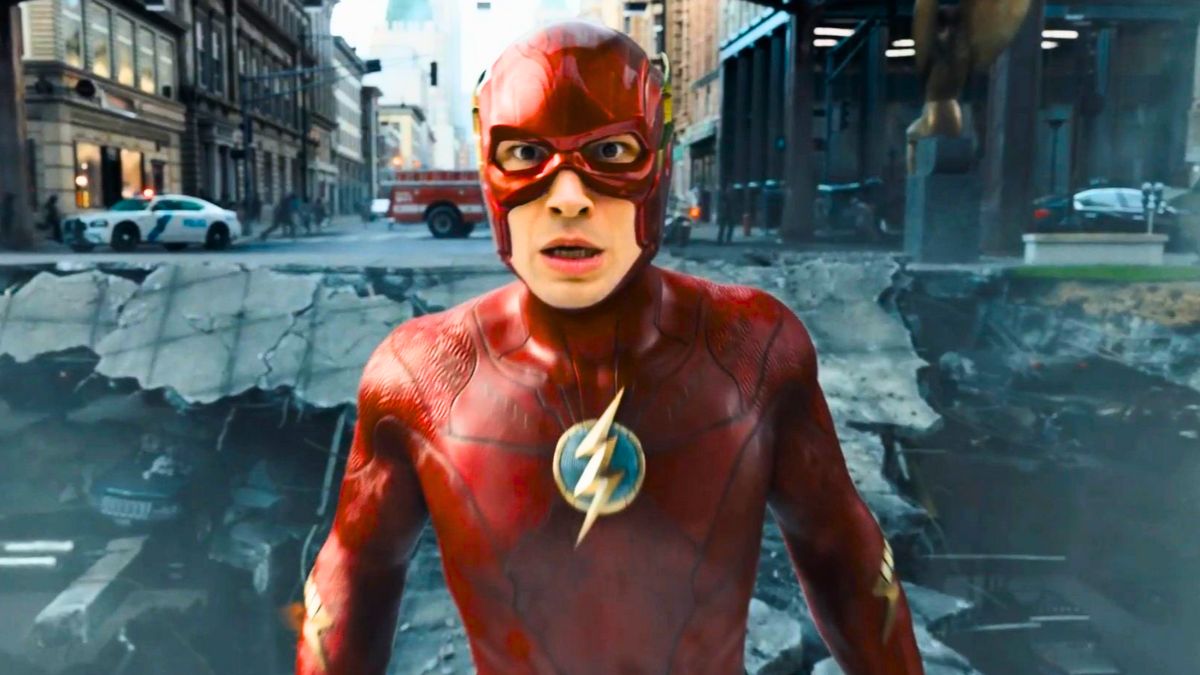Warning: Spoilers for The Flash to follow.
It’s no exaggeration to say that many an eye has been on The Flash for quite some time now, between the controversy surrounding Ezra Miller, to its continuity-high stakes and exploration of time travel and the multiverse, to more legacy cameos than we can count on one hand, to the guy in charge of the next batch of DC films calling it his favorite movie of the year; indeed, the in-universe and real-world nuances of The Flash were some of the most palpable we’ve ever seen from a comic book film.
But perhaps the biggest question on everyone’s mind is this: to what end? Was The Flash ultimately a win for the world of DC movies, or did Andy Muschietti‘s extravaganza pile on to the franchise’s lackluster reputation? One thing is for sure — there’s a lot to be said about The Flash, and it certainly didn’t have the same fire-and-forget energy that so many of its brethren seemed to be shackled with.
The Flash is, by and large, a messy movie; there’s a distinct, uncanny stroke to the way the film is paced, and for better or worse, it grabs one’s attention. From there, it becomes a matter of where you place your values; if you’re looking for some great performances, you’re in for a treat as long as you can survive the necessary evil that is Barry Allen’s younger self. If you value high-quality CGI, I’m sorry to report that the VFX artists were stretched thin, as seems to tragically be the industry standard these days. And if you value cheeky cape shenanigans and more than a few good jokes, you’ll eat perfectly fine.
But how exactly does the film affect DC as a whole? It seems like a rather silly question at first; beyond the unfortunate fact that the DC Extended Universe‘s poor continuity has rendered its very status as a cinematic universe somewhat dubious, the DCEU is on its way out in favor of James Gunn‘s incoming DC Universe reboot anyway, so whatever effect The Flash may have had, there’s not much of a remaining entity to apply such an effect to.
There is, however, a pinch intrigue in this particular discussion, and that’s the aforementioned fact that Gunn himself has named The Flash as his favorite movie of the year so far. For a lot of folks, that might be concerning considering the wildly inconsistent reception to the film, but it could spell a fascinating omen for what we can expect from the Gunnverse.
Now, in no way am I suggesting that Gunn will be trying to make films in the same vein as The Flash; the DC gaffer is six for six on major comic book screen adaptations, and he’s proven time and time again that he can birth a creative vision rather independently. What I am saying, however, is that his praise may offer us a glimpse into how Gunn’s creative eye and mind manifests the things it does.
For what flaws it has, including its unwieldy multiverse parameters and rather choppy cohesiveness, there are some unprecedentedly delectable bits and pieces in The Flash; Barry’s emotional journey and love for his mother made for some incredibly effective emotional beats against convoluted odds, Sasha Calle’s Supergirl was a fantastic character with incredible arc potential done dirty by the constraints of the plot, and the film’s dialogue divulged some surprisingly engaging team-up logistics, which added a charming layer to the business-as-usual comic book movie scenes, which were also similarly bolstered by the mainline Barry’s unique mentoring of his younger self after the latter sapped the former’s superpowers from him.
Indeed, it’s not terribly controversial to suggest that The Flash had some of the most fascinating creative meat to ever show up in a comic book film, even if it was only handled properly half the time. And, I’m of the belief that Gunn was drawn to exactly those aspects when he watched the film; Gunn didn’t just see The Flash for what it was, he saw it for what it could be, and it tickled him pink.
And given Gunn’s comic book film track record, it’s almost certainly safe to say that those are the sorts of values that the new DC gaffer will be carrying with him going forward; indeed, what may happen if we took everything that beefed The Flash up, and gave it the necessary space to reach its full potential?
So, The Flash might not directly influence the DC scene, but Gunn wouldn’t just call this movie his favorite of the year for the sake of good optics, and given just how many facets of The Flash are worthy of a very distinct brand of love, I can only giddily imagine what we’re in for when the Gunnverse starts rolling out of the kitchen.

